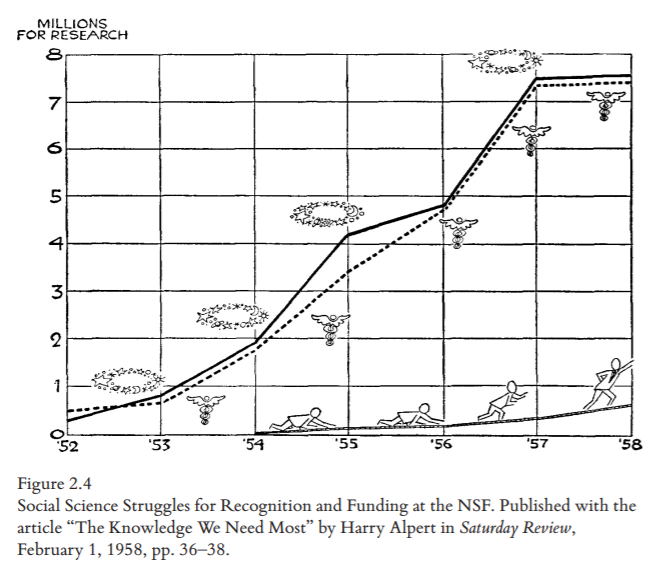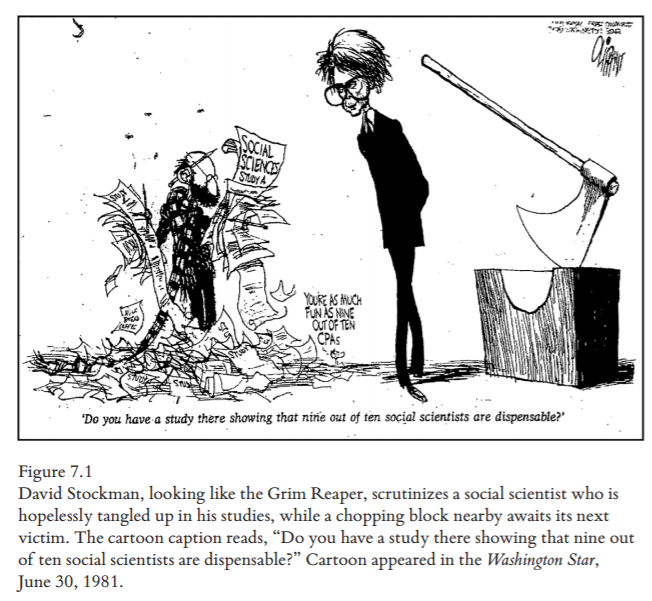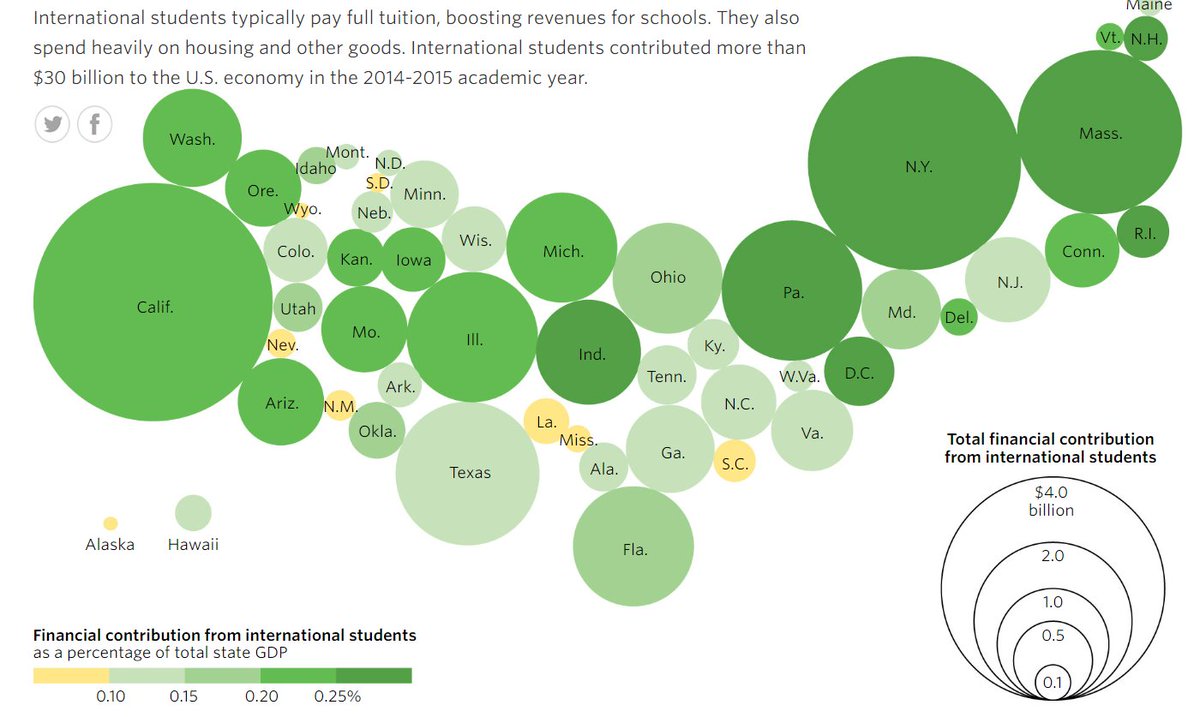
Reading Mark Solovey's Social Science for What?, on the history of social science funding at NSF, and might take a few notes here. It's open access at @mitpress: mitpress.mit.edu/books/social-s…
I know a decent amount about the history of the social sciences in the second half of the 20th c., and a decent amount about the history of NSF, but not much about the intersection of the two.
The framing is "why is this thing (SS funding) that only makes up 5% of NSF's budget so perpetually controversial?" (Good question.)
The big argument is that the conditions at NSF's origin locked in a "scientistic" approach to social sciences that persists to the present -- relegating soc sci to the role of inferior junior partner, and producing a lot of boundary work around what counts as "real" soc science.
And that this "junior partner" role deeply affected the development of the social sciences, how policymakers treated it, and even its role in American political culture.
"Scientism", here, means the idea that the social sciences are part of a single scientific enterprise, and should follow the lead of the natural sciences in order to progress.
There was lots of NSF in my first book, so reading this feels vaguely nostalgic for me. Senator Harley Kilgore, it's been far too long!
SSRC was initially skeptical of federal support for social science because of fears of government intrusion...but the temptations of $$$ led it to change its tune. How little things change.
Chemist Bradley Dewey, John Dewey's nephew, argued that the natural and social sciences needed to be kept apart -- "like hair and butter"!
Also in "plus ça change," sociologist William Ogburn declared that "'scientific sociology' was not interested in improving the world" but "in one thing only, to wit, discovering new knowledge."
Last bit for now:
Rep. Clarence Brown threatened that if the new NSF involved "a lot of short-haired women and long-haired men messing into everybody's personal affairs and lives...you are not going to get your legislation."
Rep. Clarence Brown threatened that if the new NSF involved "a lot of short-haired women and long-haired men messing into everybody's personal affairs and lives...you are not going to get your legislation."
A few more bits while I wait at the orthodontist. Extra feature: phone Twitter now randomly cuts off the last word of tweets!
1950s NSF limited its support to social science that met criteria of "objectivity, verifiability, and generality." Sounds suspiciously like "reproducibility, replicability, and generalization"! nsf.gov/sbe/SBE_Spring…
Ortho went faster than expected, just going to finish up this chapter quickly.
Sociologist Harry Alpert, who led NSF's early social science effort, urged researchers to reject association with reform movements and "the unfortunate phonetic relationship to socialism."
This is cute. I think those might be the natural sciences (stars and planets), medicine (caduceus), and social science (sad little dude). 

Set this aside during writing push but a rainy Friday afternoon seems like the perfect time for more of what you've all been waiting for: history of social sciences at the NSF: mitpress.mit.edu/books/social-s…
Political science was the most marginal of the already peripheral social sciences at NSF. In 1966 *anthropology* received 10x as much.
Here's a nice section for @williamnelligan on Sen. Fred Harris's late-60s proposal for a National Social Science Foundation:
https://twitter.com/williamnelligan/status/1377958016813838336
Basically, he was dissatisfied with both underfunding of the social sciences within NSF and with the narrowly scientistic framework it permitted. There was also the desire, post-Project Camelot, to secure the social sciences some substantial non-military sources of support.
And the bill got all the way up to 32 co-sponsors in the Senate! But NSF opposed it, for obvious reasons, and social scientists were split: those who were already well-served by NSF didn't want funding diverted.
Once Nixon was elected, it was pretty much a lost cause.
The late-60s/early-70s rise and fall of NSF’s Man, A Course of Study (MACOS) – an elementary curriculum in social science – could have been ripped from today’s headlines.
It was meant to underline scientific commonalities across different cultures, and even between human and animal communities. But it was quickly attacked for its “relativism” and lack of “moral absolutes”.
Soon, MACOS was being sensationally portrayed as teaching children about “adultery, cannibalism, killing female babies and old people, trial marriage and wife-swapping, violent murder and other abhorrent behavior.”
It led to bills that would have ended social science funding at NSF, given Congress a line-item veto for all NSF grants, and required NSF to provide Congress with all peer reviews of proposals, with names.
By the time the episode ended, MACOS was dead and NSF was out of the curriculum business.
One thing notably different, though, is that the anti-MACOS vote was not even close to party-line, like it would be today. Science was just as political. But it wasn’t as partisan.
There's a bit here for @runzach about NSF's take-up of the late-60s call for social indicators, with contributions to Social Indicators 1972 and Social Indicators 1976.
But as the head of one of these efforts said herself, "The essential theoretical prerequisites for developing a system of social accounts--defining the variables and the interrelations among them--are missing."
Last chunk, Reagan and beyond. I forgot Reagan was a sociology major lol.
I have a chapter on Reagan & econ and was afraid I was overstating the admin's antipathy to (most) social science -- but the proposed cut to NSF's social & econ sci division was *70%*.
David Stockman: "Do you have a study there showing that nine out of ten social scientists are dispensable?" 

Okay, I did not realize that Reagan appointed an NSF deputy director who came from getting the Manne L&E centers up and running.
These couple of chapters are, like, precisely at the intersection of my first book and second and all these little details are so fun.
Was really hoping the chapter on critiques of/pushback against scientism would explain how the heck NSF came to have an STS program.
Done! Conclusion touches on NSF's 2009 report on standards for qualitative research, which I hadn't thought about for a while but has some really nice bits: nsf.gov/sbe/ses/soc/IS…
And Howard Becker's snarky summary: “Quit whining and learn to do real science....Then you’ll get NSF grants like the real scientists do.” howardsbecker.com/articles/NSF.h…
@threadreaderapp unroll
• • •
Missing some Tweet in this thread? You can try to
force a refresh





